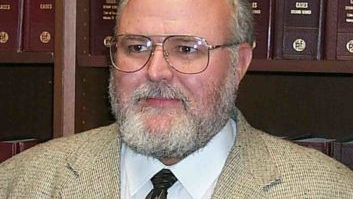The National Oceanic and Atmospheric Administration, in its quest to improve the radio service of the National Weather Service, has introduced the successor to “Craig,” the concatenated voice system which has been used for the last year or so to announce weather reports and alerts on the country’s weather radio system.
Is the new system, nicknamed “Tom,” really an improvement?
I wrote about my general level of disgust with “Craig” last fall in the Oct. 9, 2002, issue of Radio World. I have to admit that the technicians who record, edit and write the programming that makes “Tom” work have made some progress in making the system sound more human and less mechanical. It seems as though attention has been brought to bear upon some of the most glaring issues from which “Craig” suffered.
Cadence, pronunciation and (importantly) pauses and spacing between words seem much more natural. “Craig” suffered from some inflection variations, which made the speech patterns resemble noodle sandwiches, kind of screwy and off-kilter.
“Tom” seems much better balanced overall. The most significant improvement is that “Tom” lacks the occasional out-of-character faux pas that “Craig” exhibited. I am actually quite happy that “Tom” pronounces the weather condition “clear” in a normal tone of voice.
A little enthusiastic
“Craig’s” vocalization was a hyper-enthusiastic “CLEAR!!” While this might be forgivable and perhaps even endearing if used occasionally, after hearing it repeated
25 or 30 times each cycle during the reporting of regional weather conditions, I began to dread fair weather.
“Tom’s” delivery is a good deal faster than “Craig’s” was, which has increased the speed of the forecasts without sacrificing intelligibility for the most part. The system still suffers, however, from an inability to differentiate between words that are spelled identically but pronounced differently.
For example, the difference between “wind” as in the movement of air and “wind” meaning to rotate with a twisting motion are still beyond “Tom’s” understanding. New pairs of words that the voice cannot distinguish are cropping up, such as “record,” as in a new record temperature, vs. to “record” a new sound file. “Tom” uses them interchangeably.
NOAA is to be commended for its prompt action in getting our local unique place names such as Umpqua, Scapoose, Santiam and Willamette voiced and programmed into the system early in the new deployment. Now if NOAA could get a second take on some minor words, which still exist in the computer’s lexicon. Valley “basin” isn’t pronounced “bass-in,” guys.
While the forecasting itself is more accurate than ever, the greatest liability in the system is the least likely to get any corrective attention. That is the feedback loop that brings the forecaster in the regional NWS office in contact with the finished product that will be airing on the NOAA radio service.
Forecasts, warnings and advisories still are subject to being reduced to gibberish due to the inclusion of typos, punctuation errors and misspellings. A recent special weather statement was reduced to a two-minute recitation of statistics devoid of punctuation, spaces or pauses, making it completely unintelligible.
No broadcast facility in the country would allow staff to air production without checking it beforehand in the studio, so I have to wonder why a “check forecast” feature isn’t included in the regional office to allow forecasters to listen to the resulting synthesis that will possibly be used to protect life and property from the effects of adverse weather.
Is “Tom” an improvement over “Perfect Paul”? Definitely. Is he better than “Craig”? Mostly.
Is the system an improvement over the locally based, living, breathing human staff that used to provide the forecasts on NOAA weather radio? Faster? Probably. Cheaper? No doubt. Better? Not in this lifetime.
Keep working on it, people.
Radio World welcomes other points of view to [email protected].









